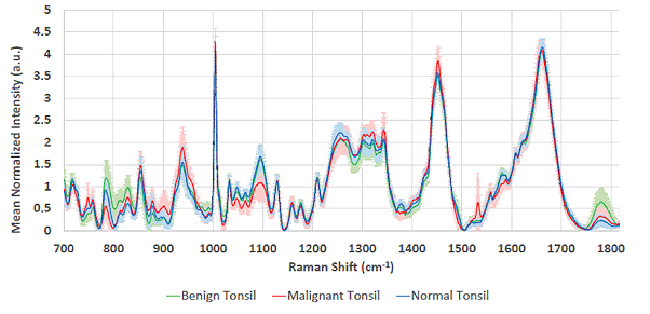Cancers of the tonsils and the base of the tongue related to the human papillomavirus (HPV) are frequently small, often with no early-stage symptoms, so many patients go undiagnosed until tumors have spread to lymph nodes in the neck.
Oropharyngeal cancers—cancers of the back of the throat, including the base of the tongue and tonsils–are the most common among men, according to a United States Cancer Statistics Data Brief issued by the Centers for Disease Control and Prevention (CDC) in August 2018. Based on data from 2011 to 2015, about 42,700 new cases of HPV-associated cancers occurred in the United States each year.
Vanderbilt researchers in the schools of engineering and medicine are exploring the feasibility of using Raman spectroscopy for early detection of HPV-related cancers of the throat in order to reduce the need for biopsies and to offer less intensive therapies.

Raman spectroscopy uses laser light, a spectrometer and either a microscope or a fiber optic probe to provide information about the tissue biochemistry which can be to evaluate noninvasively the alteration of molecular signatures in a cell or tissue transformed by disease. It is used to diagnose difficult-to-locate cancers in other parts of the body, such as the cervix and gastrointestinal tract but has never been used to investigate cancers in the oropharynx.
The collaborative project brings together Professor of Biomedical Engineering Anita Mahadevan-Jansen, director of the Vanderbilt Biophotonics Center and Orrin H. Ingram Professor of Engineering, and Giju Thomas, postdoctoral researcher in biomedical engineering; physicians Young J. Kim, Carey Burton Wood and Justin Shinn, Department of Otolaryngology; and Krystle Kuhs, Division of Epidemiology in the Department of Medicine, and Tanner J. McArdle, second-year medical student. The project is part of a Trans-Institutional Programs (TIPs) grant on HPV-associated cancers.
Their technique involves using a flexible fiber-optic probe illuminating the tissue with near infrared light and measuring the Raman scattered light with the same probe. The scattered light provides a distinct biochemical profile from the tissue.
Changes in light intensity are recorded as a ‘Raman spectra’ by a detector and relayed to a computer system where the signal is processed and then analyzed to determine whether the tissue is cancerous or non-cancerous. Using this technique, the Raman signatures are able to identify cancers without needing to take biopsies.
“Initial testing was performed on biopsy samples – ex vivo – with a Raman microscope. Subsequently, we used a portable clinical system with a 2.1 mm diameter optical probe developed at the Vanderbilt Biophotonics Center that could easily fit within a laryngoscope,” Mahadevan-Jansen said. This new technique adds only 5 to 7 minutes to the total time of the procedure.
“The TIPs award provided the funding necessary to develop and build probes specifically designed for the scopes used during biopsy. This study would not have been possible without the award,” she said.
The team’s preliminary findings suggest that this technique has the potential to sensitively differentiate between cancer and non-cancerous oropharyngeal tissues. There are no known side effects using this technique, according to the team.

Thus far, the team has enrolled three patients undergoing surgical biopsy for diagnosis of their oropharyngeal tumors for in vivo measurements using the clinical system shown in the figure above. Due to promising results, studies are currently underway in more patients to determine the effectiveness of Raman spectroscopy as a non-invasive real method for detecting oropharyngeal cancers.
“We hope to be able to develop this technology for identifying cancers that are associated with HPV and which ones are not,” Mahadevan-Jansen said.
Contact: Brenda Ellis, (615) 343-6314
brenda.ellis@vanderbilt.edu
+++
HPV ACTIVE, a Vanderbilt TIPs program, will sponsor the second-annual HPV Infection and Associated Cancers Symposium March 1, 2019. The event will include lectures on new and developing cervical cancer screening and HPV vaccination strategies.